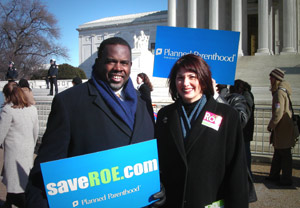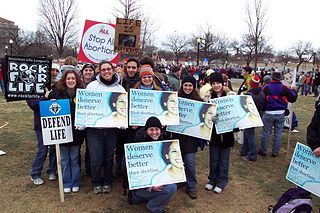Related Research Articles
Roe v. Wade, 410 U.S. 113 (1973), was a landmark decision of the U.S. Supreme Court in which the Court ruled that the Constitution of the United States generally protected a right to have an abortion. The decision struck down many abortion laws, and caused an ongoing abortion debate in the United States about whether, or to what extent, abortion should be legal, who should decide the legality of abortion, and what the role of moral and religious views in the political sphere should be. The decision also shaped debate concerning which methods the Supreme Court should use in constitutional adjudication. The Supreme Court overruled Roe in 2022, ending the constitutional right to abortion.

The United States abortion-rights movement is a sociopolitical movement in the United States supporting the view that a woman should have the legal right to an elective abortion, meaning the right to terminate her pregnancy, and is part of a broader global abortion-rights movement. The movement consists of a variety of organizations, with no single centralized decision-making body.

In the United States, abortion is a divisive issue in politics and culture wars, though a majority of Americans support access to abortion. Abortion laws vary widely from state to state.
Reproductive Freedom for All, formerly NARAL Pro-Choice America and commonly known as simply NARAL, is a non-profit 501(c)(4) organization in the United States that engages in lobbying, political action, and advocacy efforts to oppose restrictions on abortion, to expand access to legal abortion and birth control, and to support paid parental leave and protection against pregnancy discrimination.

The United Statesanti-abortion movement is a movement in the United States that opposes induced abortion and advocates for the protection of fetal life. Advocates support legal prohibition or restriction on ethical, moral, or religious grounds, arguing that human life begins at conception and that the human zygote, embryo or fetus is a person and therefore has a right to life. The anti-abortion movement includes a variety of organizations, with no single centralized decision-making body. There are diverse arguments and rationales for the anti-abortion stance. Some allow for some permissible abortions, including therapeutic abortions, in exceptional circumstances such as incest, rape, severe fetal defects, or when the woman's health is at risk.
Gonzales v. Carhart, 550 U.S. 124 (2007), was a landmark decision of the U.S. Supreme Court that upheld the Partial-Birth Abortion Ban Act of 2003. The case reached the high court after U.S. Attorney General, Alberto Gonzales, appealed a ruling of the U.S. Court of Appeals for the Eighth Circuit in favor of LeRoy Carhart that struck down the Act. Also before the Supreme Court was the consolidated appeal of Gonzales v. Planned Parenthood from the U.S. Court of Appeals for the Ninth Circuit, whose ruling had the same effect as that of the Eighth Circuit.
Governments sometimes take measures designed to afford legal protection of access to abortion. Such legislation often seeks to guard facilities which provide induced abortion against obstruction, vandalism, picketing, and other actions, or to protect patients and employees of such facilities from threats and harassment.
The Republican Majority for Choice (RMC) was a Republican organization in the United States dedicated to preserving legal access to abortion. The group also supported federal funding for all kinds of stem cell research, including embryonic stem cell research.

When Abortion Was Illegal: Untold Stories is a 1992 American short documentary film directed by Dorothy Fadiman. It was nominated for an Academy Award for Best Documentary Short. The film consists of first person stories which reveal the physical, emotional and legal consequences of having or providing an abortion when it was a criminal act. The film is the first of three films called the Reproductive Rights Trilogy or "From the Back Alleys to the Supreme Court & Beyond."

The legality of abortion in the United States and the various restrictions imposed on the procedure vary significantly, depending on the laws of each state or other jurisdiction, although there is no uniform federal law. Some states prohibit abortion at all stages of pregnancy, with few exceptions; others permit it up to a certain point in a woman's pregnancy, while some allow abortion throughout a woman's pregnancy. In states where abortion is legal, several classes of restrictions on the procedure may exist, such as parental consent or notification laws, requirements that patients be shown an ultrasound before obtaining an abortion, mandatory waiting periods, and counseling requirements.
Dorothy Fadiman is an American documentary filmmaker, director, and producer.
Motherhood By Choice, Not Chance is a 2004 documentary film directed by filmmaker, Dorothy Fadiman, which takes key moments from each of the three films from Fadiman's trilogy called, CHOICE: From the Back-Alleys to the Supreme Court & Beyond, by weaving together selected scenes and interviews. The film comes in two versions, the Activist and Educational. A Spanish Activist version was also created called, Maternidad por Elección, No por Obligación, with an introduction by Dolores Huerta.
Whole Woman's Health v. Hellerstedt, 579 U.S. 582 (2016), was a landmark decision of the US Supreme Court announced on June 27, 2016. The Court ruled 5–3 that Texas cannot place restrictions on the delivery of abortion services that create an undue burden for women seeking an abortion. On June 28, 2016, the Supreme Court refused to hear challenges from Wisconsin and Mississippi where federal appeals courts had enjoined the enforcement of similar laws.
Abortion in the District of Columbia is legal at all stages of pregnancy. In 1971, in United States v. Vuitch, the U.S. Supreme Court upheld a law saying abortion was allowed for health reasons, which include "psychological and physical well-being". Consequently, the District of Columbia became a destination for women seeking abortions starting that year.
There are no laws that restrict abortion in Minnesota based on the time from conception. The Minnesota Supreme Court ruled the Minnesota Constitution conferred a right to an abortion in 1995 and the DFL-led Minnesota Legislature passed and Minnesota Governor Tim Walz signed into law a bill in 2023 to recognize a right to reproductive freedom and preventing local units of government from limiting that right. The Center for Reproductive Rights labels Minnesota as one of the most abortion-protective states in the country.
Abortion in Nebraska is illegal after the 12th week of pregnancy, after new legislation was signed in May 2023.
Abortion in New Jersey is legal at all stages of pregnancy. Abortion related laws were drafted by the legislature by the end of the 1900s. These laws would be addressed in court during the 1800s as they related to application in prosecutions of women for having abortions. During the 1940s, hospitals created committees to approve abortion requests, with the goal of trying to reduce the number of abortions performed at them. Currently, there are no required waiting times, and parental consent is not required.
Abortion in California is legal up to the point of fetal viability. An abortion ban was in place by 1900, and by 1950, it was a criminal offense for a woman to have an abortion. In 1962, the American Law Institute published their model penal code, as it applied to abortions, with three circumstances where they believed a physician could justifiably perform an abortion, and California adopted a version of this code. In 2002, the California State Legislature passed a law guaranteeing women the right to have an abortion "prior to viability of the fetus, or when the abortion is necessary to protect the life or health of the woman". In 2022, California voters overwhelmingly approved Proposition 1, which amended the Constitution of California to explicitly protect the right to abortion and contraception by a margin of 33.76%.
Dobbs v. Jackson Women's Health Organization, 597 U.S. 215 (2022), is a landmark decision of the U.S. Supreme Court in which the court held that the Constitution of the United States does not confer a right to abortion. The court's decision overruled both Roe v. Wade (1973) and Planned Parenthood v. Casey (1992), returning to the federal and state legislatures the power to regulate any aspect of abortion not protected by federal statutory law.

A series of ongoing protests supporting abortion rights and anti-abortion counter-protests began in the United States on May 2, 2022, following the leak of a draft majority opinion for the U.S. Supreme Court case Dobbs v. Jackson Women's Health Organization, which stated that the Constitution of the United States does not confer any Reproductive rights, thus overturning Roe v. Wade and Planned Parenthood v. Casey. On June 24, 2022, the Supreme Court officially overturned Roe and Casey in Dobbs, resulting in further protests outside of the U.S. Supreme Court building and across the country, eventually to major cities across the world both in favor of and against the decision.